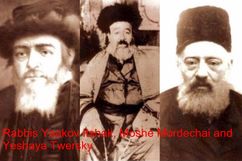 I, and many others with a similar background, owe a great debt to a young Ukrainian called Vitaliy Buryak, who is single-handedly documenting the shtetls of Ukraine on his website (link below). He has recently put together a page on Makarov, the home of my great-grandfather Meyer Unikow. This week I have been providing him with some information for the site, some of which he will pass on to the museum in Makarov, where the new curator is putting together an exhibition on the town’s Jewish community. The town is about 40 miles west of Kiev, with a population of around 12,000. In 1897, when my great-grandfather was 25 years old, almost 4,000 Jews lived in Makarov, about three-quarters of the town’s population. Today there are 10, all of them incomers after World War II. My great-grandfather (on my grandmother’s paternal side) grew up at the court of the Twersky Rabbis of Makarov, a famous Hassidic dynasty that originated in Chernobyl, a town now notorious for an entirely different reason. Rebbe Menachem Nachum Twersky (b.1805, Chernobyl – d. 1852, Makarov), the first son of the second Chernobyl rebbe, founded the Makarov branch of the dynasty. The rabbis that my family would have lived, studied, prayed and eaten with are Rebbe Yaakov Itshak Twersky (1828-1892, Makarov), Rebbe Moshe Mordechai Twersky (b. 1843, Makarov – d.1920 Berdichev) and Rebbe Yeshaya Twersky (b. 1861, Makarov – d.1919, Kiev). Rebbe Yaakov Itshak was a very influential rabbi, respected by the community. My great-great grandfather (on my grandmother’s maternal side) Berl Shnier was a devoted follower of his, despite living a day’s journey away in the town of Pavoloch. He would consult the Makarover rabbi on all important family matters, and usually spent Shabbat at the Twersky court. This is how he came to arrange the marriage of his daughter to the son of one of the Rabbi’s right-hand men and tutor to his sons – my great-great grandfather Velvl Unikow. Rebbe Moshe Mordechai Twersky was apparently famous for the power of his prayers, making them unforgettable for those who heard them. His son, Rebbe Tsvi Arye, who was known as a healer and miracle-worker, moved the court to the larger town of Berdichev – considered the capital of the Jewish Pale – after his father’s death. Makarov’s Jewish population was decimated during the Civil War of 1917-21, in particular in the summer of 1919 when pogroms by a faction led by the Cossack leader Sokolovsky and another led by Matviyenko slaughtered 20 Jews and prompted the majority of the Jewish population to flee. Of those who remained, around half were killed by a further pogrom carried out by the White Army under General Denikin. Most of those who fled never returned to Makarov and by 1926 the town’s Jewish population had been slashed to under 600. Vitaliy’s website recounts events described in some of the memoirs written about the pogroms by those who witnessed them. The details are truly horrific. During World War II, Makarov was occupied by the Nazis from July 1941-November 1943. In the autumn of 1941, up to 100 Jews were shot, amid several other mass shootings of between 7 and 30 members of the Jewish community at a time. Their belongings were sold to the local population. I visited Makarov with my father in 2005. The Twersky court was destroyed by the Nazis and nobody in the town knows exactly where it stood. The place where the main synagogue was located is now a rubble-strewn patch of wasteland close to the large, Soviet-style town square. The old Jewish cemetery has been destroyed. The graves of the Twersky rabbis Moshe Mordechai and Tsvi Arye were safeguarded and their remains reside in the vast Jewish cemetery in Berdichev. Thanks to money sent from abroad, their graves are topped with newly hewn gravestones of slate and marble and housed in a small, painted mausoleum. More information is available at http://jewua.org/makarov/
0 Comments
Leave a Reply. |
Keeping stories aliveThis blog aims to discuss historical events relating to the Jewish communities of Ukraine, and of Eastern Europe more widely. As a storyteller, I hope to keep alive stories of the past and remember those who told or experienced them. Like so many others, I am deeply troubled by the war in Ukraine and for the foreseeable future, most articles published here will focus on the war, with an emphasis on parallels with other tumultuous periods in Ukraine's tragic history. Archives
March 2024
Categories
All
|
 RSS Feed
RSS Feed
